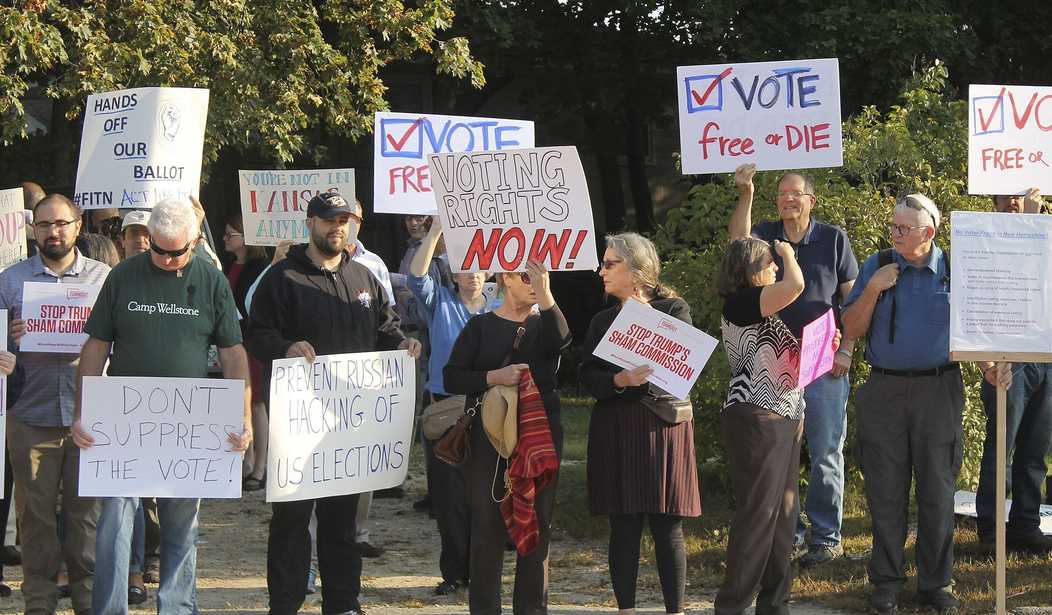By now, you’ve become familiar with automatic mail ballots. You also probably are familiar with election officials suspending the statutory rules governing elections in 2020 as they did in Pennsylvania, Virginia, and elsewhere.
If you really get around, then you’ve come across Zuckbucks, the nearly half-billion dollars that came from Facebook founder Mark Zuckerberg and went into government election offices in urban cores to create turnout machines for Joe Biden.
But you might not have met ERIC.
ERIC isn’t a person. ERIC stands for the Electronic Registration and Information Center. ERIC is an entity that has more to do with American elections than just about anyone. States have outsourced cleaning voter rolls and much more to ERIC.
First, let’s start with where ERIC was born.
ERIC was born at the Pew Charitable Trust, naturally seeded with money from the Open Society Institute.
Early participants in ERIC were almost all blue states. Once leftist groups — including Biden federal court nominee Dale Ho from his perch at the ACLU — wrecked the competing cross-check program run by the Kansas Secretary of State, then red states started joining ERIC. This includes Texas, South Carolina, Utah, West Virginia, and Florida.
Before your hair catches fire because of ERIC’s Sorosy pedigree, realize that ERIC does something states haven’t done successfully on their own. ERIC is the primary firewall to keep voter rolls clean and free of dead registrants and those registered in multiple states.
How is it supposed to work?
Over the past decade, thirty-one states joined ERIC. The states pay dues to ERIC. They send their statewide registration list to ERIC for analysis across multiple member states. In essence, an ERIC member sends taxpayer funds, the state voter rolls, and all driver records.
ERIC flags individuals registered in multiple states. ERIC also sniffs out dead registrants. Once ERIC finds either, they send the information back to client states to conduct list maintenance.
The good news is that ERIC is the primary tool states have to keep rolls clean across state lines. The bad news is it comes with a big price, both in transparency and in dollars. The even worse news is that ERIC is not doing the best job it could in cleaning rolls.
First the money. ERIC member states can pay millions to ERIC. When I testified to the Texas House of Representatives when Texas was considering ERIC, I noted that the Kansas cross-check was free, but ERIC cost millions. Texas smartly did not join ERIC then. But unfortunately, after the left blew the Kansas cross-check compact apart, there was no alternative but ERIC.
Related: Pence Says There Were ‘Irregularities’ in 2020 Election
Second, ERIC is creating a smokescreen and hiding what is happening with election administration.
Remember in 2020 when Michigan election officials put cardboard over the glass windows and blocked citizens from observing the tabulation of election results? That’s what ERIC is doing with list maintenance activities, just without the cardboard.
Member states have a contract with ERIC that limits their ability to release information about the process to the public.
ERIC’s secrecy violates federal law. Under the National Voter Registration Act, anyone has a right to publicly inspect records related to voter roll maintenance. Courts have uniformly upheld these public inspection rights in case after case, most of which I have been involved in as an attorney.
Congress had good reason to make list maintenance records public. If a state is knocking people off the rolls for no good reason — as Virginia did to American citizens by labeling some as non-citizens — then the public should be able to find out what is going wrong.
Or, as Pennsylvania did for two decades and allowed aliens to register to vote in the regular PennDot DMV voter applications, the public should be able to see how and why government officials screwed up so badly.
Not surprisingly, Pennsylvania has been fighting in court for three years to prevent disclosure of documents showing exactly how many thousands of aliens registered and voted.
One former state election official from an ERIC state told me he was “always concerned something shady was going on at ERIC,” but even ERIC members can’t see behind the curtains. Another statewide election official who served on ERIC’s board has been trying to get answers for years about ERIC’s internals without success.
My organization, the Public Interest Legal Foundation, filed lawsuits under the National Voter Registration Act against Colorado and the District of Columbia to break through the smokescreens mandated by ERIC. More may be coming.
In law school, every lawyer learned that a contract cannot contradict an established public policy. Congress said the election records that ERIC is hiding are public.
It’s time for ERIC to get back to doing what it is supposed to do — help states do what they cannot do alone and find and remove dead and duplicate registrants across state lines.










Join the conversation as a VIP Member